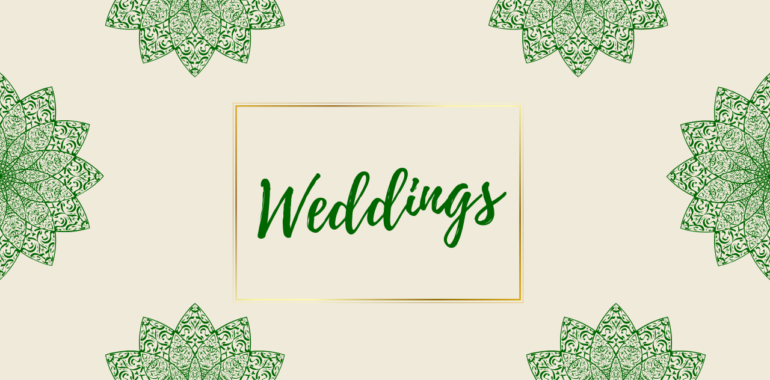Weddings: A Celebration of Love, Tradition, and New Beginnings
Weddings are one of the most profound and celebrated milestones in life. They mark the union of two individuals, bound by love, with the promise of sharing a life together. While weddings are deeply personal, they are also social events that bring families and friends together to celebrate love, commitment, and the start of a new chapter. Whether simple or extravagant, traditional or modern, weddings hold universal significance, making them a unique and timeless occasion.
In this article, we explore the various facets of weddings—history, traditions, modern trends, and how to plan the perfect celebration. By examining the diversity of weddings worldwide, we uncover the different ways cultures celebrate the union of two people.
1. The History and Significance of Weddings
Weddings have been a part of human culture for centuries, evolving with time and shaped by societal, religious, and cultural influences. The tradition of marriage as a legal and social contract can be traced back to ancient civilizations, such as the Egyptians, Greeks, and Romans. Initially, marriages were not about love but were often viewed as alliances to preserve family lineage, property, and wealth.
The Evolution of Weddings:
- Ancient Times: Early marriages were arranged, often serving strategic or political purposes. In Ancient Rome, weddings were celebrated with a contract that formalized the union. In many cultures, weddings were also linked to religious rites that sanctified the union.
- Medieval and Renaissance Periods: During the medieval period, marriages were often performed by religious leaders in Christian ceremonies. The focus of the wedding began to shift more toward the concept of love, though it remained largely a union for social and economic purposes.
- Modern Weddings: Over time, weddings became more individualized, with a focus on personal expression and love. The emergence of romantic love as a basis for marriage in the 18th and 19th centuries laid the foundation for the modern wedding we recognize today.
In contemporary society, weddings are celebrated as joyous occasions, symbolizing the beginning of a life together, based on love, respect, and mutual support.
2. Types of Weddings: Traditional and Modern Variations
Weddings come in a variety of styles, each reflecting the values, preferences, and cultures of the couple. Some couples opt for traditional ceremonies rooted in cultural or religious customs, while others choose modern or non-traditional approaches. Here are some of the most popular wedding styles:
1. Traditional Weddings
Traditional weddings are often tied to cultural, religious, or familial customs. They adhere to long-established practices and rituals that have been passed down through generations.
- Christian Weddings: Christian weddings typically take place in a church and involve the exchange of vows, the blessing of the union, and the sharing of communion. The bride often wears a white gown, symbolizing purity, and the couple may exchange rings as a symbol of their commitment.
- Hindu Weddings: Hindu weddings are deeply spiritual and often take place over several days, involving a series of rituals, prayers, and celebrations. The couple exchanges garlands, and the bride and groom take seven steps around a sacred fire (saptapadi) as part of their vows.
- Jewish Weddings: In Jewish weddings, the couple stands under a chuppah (wedding canopy), symbolizing the home they will build together. The groom breaks a glass at the end of the ceremony, symbolizing the fragility of life and the joy and sorrow that come with marriage.
- Muslim Weddings: Muslim weddings involve the signing of a marriage contract, often with a mahr (dowry) being agreed upon. The ceremony includes the recitation of prayers and vows in front of family and friends, and the couple is typically married by an imam.
2. Modern Weddings
Modern weddings allow for more flexibility and personal expression. Couples are moving away from strictly adhering to traditions and embracing new ways to celebrate their love.
- Destination Weddings: Couples often choose to get married in an exotic or scenic location away from home. Destination weddings are typically smaller, more intimate affairs, and they offer a unique experience for the couple and their guests.
- Themed Weddings: Many couples are opting for creative, themed weddings that reflect their personalities and interests. Whether it’s a vintage, bohemian, or fairy tale theme, these weddings often incorporate elements like special decorations, costumes, and non-traditional venues.
- Elopements: For couples who prefer an intimate, low-key affair, elopements are a growing trend. Instead of a large wedding, the couple may elope to a special destination or simply have a small ceremony with only close family or friends in attendance.
- LGBTQ+ Weddings: As the LGBTQ+ community gains more visibility and legal recognition, same-sex weddings are increasingly common. These weddings celebrate love in all its forms, and many couples choose to combine traditional and contemporary elements to personalize their ceremonies.
3. Wedding Planning: A Step-by-Step Guide
Planning a wedding can be an exciting yet overwhelming experience. With so many details to consider, from choosing the right venue to selecting the perfect wedding dress, the planning process requires careful attention to ensure that the day runs smoothly. Below is a general guide to help couples organize their wedding:
1. Set a Budget
Before diving into the planning process, it’s important to establish a budget. Wedding expenses can add up quickly, so knowing how much you can spend will help prioritize what matters most to you. Consider allocating funds for the venue, catering, entertainment, attire, photography, and décor, among other elements.
2. Choose a Venue
The wedding venue sets the tone for the entire event. Some popular venues include churches, hotels, gardens, beaches, and banquet halls. When selecting a venue, consider factors such as guest capacity, location, cost, and whether the venue aligns with your desired aesthetic.
3. Create a Guest List
Creating the guest list is one of the most challenging tasks for many couples, as it involves balancing family expectations with personal preferences. A clear guest list will help you determine the size of your venue and plan the catering accordingly.
4. Select Your Wedding Party
The wedding party typically includes bridesmaids, groomsmen, flower girls, and ring bearers. These individuals play important roles in the ceremony and are often responsible for supporting the couple throughout the wedding planning process.
5. Choose Your Attire
Choosing the right wedding attire is one of the most fun (and sometimes stressful) parts of wedding planning. The bride may choose a wedding dress that reflects her style, whether it’s classic, modern, or bohemian. The groom typically wears a suit or tuxedo, though some opt for a more casual look depending on the wedding style.
6. Catering and Cake
Food is a key element of most weddings. You’ll need to decide on a menu that appeals to your guests and suits the theme of your wedding. Wedding cakes are a traditional part of the celebration, and many couples now opt for alternative desserts or multi-tiered cakes with unique designs.
7. Entertainment and Music
Music helps set the mood and tone of the wedding. Couples can hire a live band, DJ, or even create their own playlist for the ceremony and reception. Popular songs include the first dance song for the bride and groom, as well as songs to play during the reception to encourage dancing.
8. Photography and Videography
Hiring a professional photographer and videographer ensures that you capture all the special moments of the wedding day. You can choose a photographer who specializes in traditional, candid, or artistic wedding photography, depending on your preferences.
9. Final Touches and Décor
Décor plays a vital role in creating a beautiful and memorable wedding experience. From flowers and table settings to lighting and signage, the decor should reflect your theme and personality. Whether it’s an elegant, rustic, or whimsical wedding, the final touches will make your celebration unique.
4. Wedding Traditions from Around the World
Weddings around the world vary greatly in customs and traditions. While some rituals are universal, others are deeply rooted in the history and beliefs of different cultures. Below are a few fascinating wedding traditions from across the globe:
1. Chinese Weddings
In Chinese weddings, the color red is considered to symbolize good fortune and happiness. The bride often wears a red gown, and the ceremony includes the “tea ceremony,” where the couple serves tea to their elders as a sign of respect and to receive blessings.
2. Mexican Weddings
Mexican weddings often feature vibrant colors and festive music. A common ritual is the “lazo” ceremony, where the bride and groom are tied together with a rope or floral garland to symbolize their unity.
3. Scottish Weddings
In traditional Scottish weddings, the bride may wear a kilt, and the groom may wear a “clootie tree” ceremony. After the wedding, guests tie cloths to a tree to represent their wishes for the couple’s future.
4. Nigerian Weddings
Nigerian weddings, especially among the Yoruba people, are elaborate affairs that feature a “bride price” negotiation, vibrant attire, traditional dances, and a festive atmosphere.
5. The Future of Weddings
As wedding trends continue to evolve, there is a growing emphasis on personalization and inclusivity. Couples today are choosing to break away from traditional norms, embracing diverse wedding styles that reflect their unique personalities and values. The rise of sustainable weddings, inclusive ceremonies for LGBTQ+ couples, and the use of technology to create virtual celebrations are among the many trends that will shape the future of weddings.
Conclusion: Celebrating Love and Unity
Weddings are more than just a celebration—they are a reflection of love, commitment, and the joy that comes with starting a new life together. Whether they are grand, intimate, traditional, or modern, weddings serve as a testament to the union of two people embarking on a lifelong journey. With countless traditions, styles, and approaches to planning, weddings are ultimately about celebrating the bond between two people and sharing that joy with those they hold dear.
No matter the scale or tradition, the essence of a wedding is love—an emotion that transcends all boundaries, making each celebration a deeply meaningful occasion. So, whether you’re planning your own wedding or attending a loved one’s, remember that weddings are a celebration of life’s most beautiful moments.


